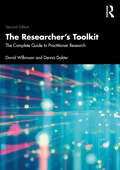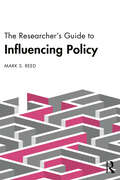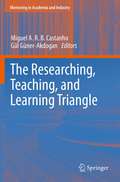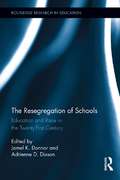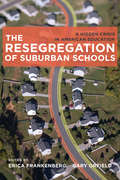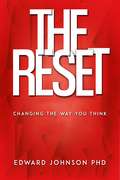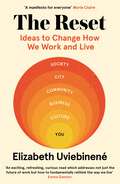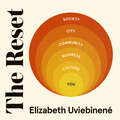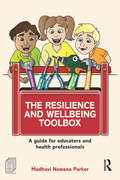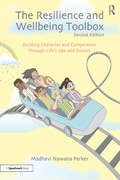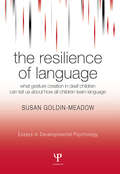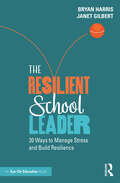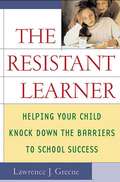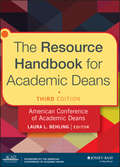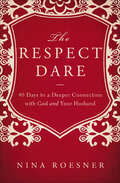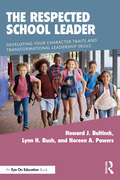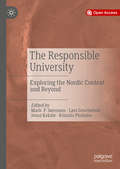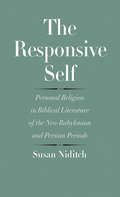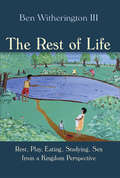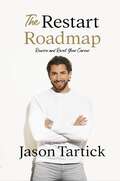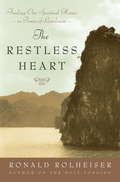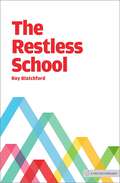- Table View
- List View
The Researcher's Toolkit: The Complete Guide to Practitioner Research (Routledge Study Guides)
by David Wilkinson Dennis DokterDesigned for those undertaking research for the first time, this fully updated edition of The Researcher's Toolkit is a practical and accessible guide for all those partaking in small-scale research. Jargon-free and assuming no prior knowledge, it covers the entire research process, from defining a research topic or question through to its completion. This second edition has been fully revised by a collaborating team with a wealth of knowledge and practical experience in research project work. Including activity boxes to highlight key concepts and short summary boxes to indicate fundamental elements of various research areas, the chapters cover: The importance of research and framing your research question and research ethics Practical elements associated with planning and executing your research activity The application of survey-based research methods and the value provided by social media as data collection devices Deploying both quantitative and qualitative tools and techniques to analyse research data Writing up your research work and preparing it for wider access and consumption Examining the effect of your research work through assessing or measuring its impact The Researcher’s Toolkit is a must-read guide for students and budding researchers as well as educators seeking to explain academic research and writing to their pupils. It will benefit anyone looking to complete a research project whether inside academia or beyond.
The Researcher’s Guide to Influencing Policy
by Mark S. ReedDesigned to help navigate the complex and ethical challenges of working with policy, this must-read book will help researchers effect changes with meaningful and widespread impact. Readers will learn how to negotiate complex power dynamics, use informing and influencing strategies and play critical roles in policy networks to give voice to those who are rarely heard in the corridors of power.This guide is based on two decades of Professor Reed’s peer-reviewed work on the impact of research and his experience using his environmental research to influence policy around the world. It covers the tried and tested practical skills needed to co-produce policy options, based on rigorous evidence and the perspectives of those whose lives will ultimately be affected by policy. Importantly, it provides the tools required to communicate research effectively to policy audiences and collect evidence of policy impacts.Applicable to all disciplines and career stages, The Researcher’s Guide to Influencing Policy provides the confidence needed to start engaging with policy safely, responsibly and effectively. It is time to get out of the echo chamber of research and policy elites and to start getting our hands dirty with the messy reality of real-world policy.
The Researching, Teaching, and Learning Triangle
by Gul Guner Miguel A. CastanhoIt is impossible not to ask ourselves how to cope with the role and impact of scientific research in teaching and learning. The researching, teaching and learning triangle explores a growing trend among top universities across the world to focus attention on the quality of post-graduate education and the success of the educators, using pioneering examples, ranging from classroom-level initiatives to university-wide projects. This book will be of interest to all scientists, from the budding beginner to the seasoned supervisor.
The Resegregation of Schools: Education and Race in the Twenty-First Century (Routledge Research in Education)
by Jamel K. Donnor Adrienne D. DixsonAccess to a quality education remains the primary mechanism for improving one’s life chances in the United States, and for children of color, a “good education” is particularly linked to their individual and collective well-being. Despite the popular perception that America is in a “post-racial” epoch, opportunities to access quality learning environments and human development resources remain determined according to race, class, gender, and ability. Taking a more nuanced approach to race and the resegregation of the American school system, this volume examines how and why the education quality for the majority of students of color in America remains fundamentally unequal.
The Resegregation of Suburban Schools: A Hidden Crisis in American Education
by Erica Frankenberg Gary Orfield"The United States today is a suburban nation that thinks of race as an urban issue, and often assumes that it has been largely solved," write the editors of this groundbreaking and passionately argued book. They show that the locus of racial and ethnic transformation is now clearly suburban and illustrate patterns of demographic change in the suburbs with a series of rich case studies. The book concludes by considering what kinds of strategies school officials and community leaders can pursue at all levels to improve opportunities for suburban low-income students and students of color, and what ways address the challenges associated with demographic change.
The Resegregation of Suburban Schools: A Hidden Crisis in American Education
by Erica Frankenberg"The United States today is a suburban nation that thinks of race as an urban issue, and often assumes that it has been largely solved,&” write the editors of this groundbreaking and passionately argued book. They show that the locus of racial and ethnic transformation is now clearly suburban and illustrate patterns of demographic change in the suburbs with a series of rich case studies. The book concludes by considering what kinds of strategies school officials and community leaders can pursue at all levels to improve opportunities for suburban low-income students and students of color, and what ways address the challenges associated with demographic change.
The Reset: Changing the way you think
by Edward JohnsonDo you need to make a new start? Or has God decided to restart your life? For many God has hit the “hard reset” of our lives. In The Reset: Changing the Way your Think book, Dr. Edward Johnson uses the strategies the lord has given him as well as his own reset for his life to teach you how you can become the better version of yourself through Christ Jesus.
The Reset: Ideas to Change How We Work and Live
by Elizabeth Uviebinené Elizabeth UviebinenéSome people seek purpose in work. Others see work as a tool to live with purpose outside of work. Where do you sit on this scale?'An exciting, refreshing, curious read which addresses not just the future of work but how to fundamentally rethink the way we live' -EMMA GANNON, author of The Sunday Times bestseller The Multi-Hyphen Method"At a time when many of us are reconsidering our work/life balance in the long-term, it's an illuminating read." - Cosmopolitan"The Reset is a provocative guide to how we fit into an ecosystem' - The Financial Times"This book made me stop and rethink my relationship with work. Elizabeth challenges us all to create a new social contract with trust, purpose and community at its heart. Where we work by design and not by default and in doing so, create a world of work that is more balanced, inclusive and better for everyone." - Helen Tupper, CEO of Amazing If and co-author of The Squiggly Careers________________Being busy isn't an IdentityPerks aren't office CultureProfit isn't all we want from BusinessLoneliness shouldn't happen in a CommunityInequality isn't inevitable in a CityWe can all shape SocietyFrom the award-winning author and Financial Times columnist Elizabeth Uviebinené, a fundamental rethink of how we work and live. Because if we're going to really benefit from the radical shift of 2020, we have to rethink how we fit into an ecosystem. Elizabeth started with a simple desire to explore our relationship with work, and how it was impacting our lives. It became clear if we want to reset how we work as individuals, we're going to need to reset the work culture we exist in, the businesses we work for, the communities we're a part of, the cities we live in and the society we can shape. We can't just rethink one strand of society; we need to rethink everything together. It's time for a Reset. The Reset is a short, digestible book for people who want to work better, and live better. Elizabeth addresses our urge to work differently, to work in a way that suits more parts of our lives. It's optimistic, positive and provocative, offering fresh perspectives on the way we live now, and a punchy idea for how we might live in the future. So what's possible now that would have seemed impossible before? The Reset features interviews from:Sadiq Khan, Mayor of LondonAlex Mahon, CEO of Channel 4Ete Davies, CEO of Engine GroupRachel Botsman, Oxford University's first Trust fellowSereena Abassi, Worldwide Head of Culture and Inclusion, M&C SaatchiAnna Whitehouse (Mother Pukka), flexible working campaignerCassandra Stavrou, Founder of ProperIndy Johar, Founder of think tank Dark Matter LabsNadia Whittome, Labour MP for NottinghamPip Jameson, Founder of the DotsKaren Rosenkranz, trend forecaster and consultantJoanna Lyall, UK CEO of Brainlabs
The Reset: Ideas to Change How We Work and Live
by Elizabeth UviebinenéSome people seek purpose in work. Others see work as a tool to live with purpose outside of work. Where do you sit on this scale?'An exciting, refreshing, curious read which addresses not just the future of work but how to fundamentally rethink the way we live' -EMMA GANNON, author of The Sunday Times bestseller The Multi-Hyphen Method"At a time when many of us are reconsidering our work/life balance in the long-term, it's an illuminating read." - Cosmopolitan"The Reset is a provocative guide to how we fit into an ecosystem' - The Financial Times"Uviebinené's passion about resetting how we live and work is infectious and eye-opening." - Marie Claire"This book made me stop and rethink my relationship with work. Elizabeth challenges us all to create a new social contract with trust, purpose and community at its heart. Where we work by design and not by default and in doing so, create a world of work that is more balanced, inclusive and better for everyone." - Helen Tupper, CEO of Amazing If and co-author of The Squiggly Careers________________Being busy isn't an IdentityPerks aren't office CultureProfit isn't all we want from BusinessLoneliness shouldn't happen in a CommunityInequality isn't inevitable in a CityWe can all shape Society From the award-winning author and Financial Times columnist Elizabeth Uviebinené, a fundamental rethink of how we work and live. Because if we're going to really benefit from the radical shift of 2020, we have to rethink how we fit into an ecosystem. Elizabeth started with a simple desire to explore our relationship with work, and how it was impacting our lives. It became clear if we want to reset how we work as individuals, we're going to need to reset the work culture we exist in, the businesses we work for, the communities we're a part of, the cities we live in and the society we can shape. We can't just rethink one strand of society; we need to rethink everything together. It's time for a Reset. The Reset is a short, digestible book for people who want to work better, and live better. Elizabeth addresses our urge to work differently, to work in a way that suits more parts of our lives. It's optimistic, positive and provocative, offering fresh perspectives on the way we live now, and a punchy idea for how we might live in the future. So what's possible now that would have seemed impossible before? The Reset features interviews from:Sadiq Khan, Mayor of LondonAlex Mahon, CEO of Channel 4Ete Davies, CEO of Engine GroupRachel Botsman, Oxford University's first Trust fellowSereena Abassi, Worldwide Head of Culture and Inclusion, M&C SaatchiAnna Whitehouse (Mother Pukka), flexible working campaignerCassandra Stavrou, Founder of ProperIndy Johar, Founder of think tank Dark Matter LabsNadia Whittome, Labour MP for NottinghamPip Jameson, Founder of the DotsKaren Rosenkranz, trend forecaster and consultantJoanna Lyall, UK CEO of Brainlabs
The Reset: Ideas to Change How We Work and Live
by Elizabeth UviebinenéBeing busy isn't an IdentityPerks aren't office CultureProfit isn't all we want from BusinessLoneliness shouldn't happen in a CommunityInequality isn't inevitable in a CityWe can all shape Society From the award-winning author and Financial Times columnist Elizabeth Uviebinené, a fundamental rethink of how we work and live. Because if we're going to really benefit from the radical shift of 2020, we have to rethink how we fit into an ecosystem. Elizabeth started with a simple desire to explore our relationship with work, and how it was impacting our lives. It became clear if we want to reset how we work as individuals, we're going to need to reset the work culture we exist in, the businesses we work for, the communities we're a part of, the cities we live in and the society we can shape. We can't just rethink one strand of society; we need to rethink everything together. It's time for a Reset. The Reset is a short, digestible book for people who want to work better, and live better. Elizabeth addresses our urge to work differently, to work in a way that suits more parts of our lives. It's optimistic, positive and provocative, offering fresh perspectives on the way we live now, and a punchy idea for how we might live in the future. So what's possible now that would have seemed impossible before? The Reset features interviews from:Sadiq Khan, Mayor of LondonAlex Mahon, CEO of Channel 4Ete Davies, CEO of Engine GroupRachel Botsman, Oxford University's first Trust fellowSereena Abassi, Worldwide Head of Culture and Inclusion, M&C SaatchiAnna Whitehouse (Mother Pukka), flexible working campaignerCassandra Stavrou, Founder of ProperIndy Johar, Founder of think tank Dark Matter LabsNadia Whittome, Labour MP for NottinghamPip Jameson, Founder of the DotsKaren Rosenkranz, trend forecaster and consultantJoanna Lyall, UK CEO of Brainlabs(P)2021 Hodder & Stoughton Limited
The Resilience and Wellbeing Toolbox: A guide for educators and health professionals
by Madhavi Nawana ParkerThe Resilience and Wellbeing Toolbox is an inspiring book and a beacon for social emotional change in schools. Within these pages teachers and other professionals will find fantastic resources that they can easily implement in the classroom. By following this programme, teachers will see their students developing skills in persistence, problem solving and emotional regulation as well as independence, empathy, kindness, contribution and good will, whilst planting the essential seeds of resilience and wellbeing. Helpful suggestions offered in each chapter on how to bring wellbeing and resilience into the home can be shared with parents and families. The lively and engaging resources in this book include: Practical, photocopiable guide sheets and worksheets, also available as eResources Adaptable role plays and activities Solid research-based strategies A flexible framework that can be creatively implemented in the classroom This is a must-have handbook for anyone seeking to provide young people in their care with a strong foundation for better social, emotional and learning outcomes. Resources can be downloaded at https://www.routledge.com/The-Resilience-and-Wellbeing-Toolbox-A-guide-for-educators-and-health/Nawana-Parker/p/book/9781138921177
The Resilience and Wellbeing Toolbox: Building Character and Competence through Life’s Ups and Downs
by Madhavi Nawana ParkerThis fully updated second edition is a practical guide for parents, teachers and other professionals to create cultures of resilience and wellbeing in schools, homes and health care settings. Students will build lifelong competencies to improve their emotional regulation, empathy, persistence, problem solving, mindset, optimism, gratitude, kindness and values; improving their psychological readiness to bounce back from life’s ups and downs. Alongside new lesson plans that are even easier to follow and specific guidance on how to meet criteria on social emotional learning frameworks, the lively and engaging resources in this book include: Practical, photocopiable guide sheets and worksheets, also available as eResources via www.positivemindsaustralia.com.au Adaptable role plays and activities Solid research-based strategies A flexible framework that can be creatively implemented in classrooms, homes and health care settings Parent tips at the end of each chapter This is a must-have handbook for anyone seeking to provide young people in their care with a strong foundation for life long social, emotional and learning outcomes.
The Resilience of Language: What Gesture Creation in Deaf Children Can Tell Us About How All Children Learn Language (Essays in Developmental Psychology)
by Susan Goldin-MeadowImagine a child who has never seen or heard any language at all. Would such a child be able to invent a language on her own? Despite what one might guess, the children described in this book make it clear that the answer to this question is 'yes'. The children are congenitally deaf and cannot learn the spoken language that surrounds them. In addition, they have not yet been exposed to sign language, either by their hearing parents or their oral schools. Nevertheless, the children use their hands to communicate - they gesture - and those gestures take on many of the forms and functions of language. The properties of language that we find in the deaf children's gestures are just those properties that do not need to be handed down from generation to generation, but can be reinvented by a child de novo - the resilient properties of language. This book suggests that all children, deaf or hearing, come to language-learning ready to develop precisely these language properties. In this way, studies of gesture creation in deaf children can show us the way that children themselves have a large hand in shaping how language is learned.
The Resilient School Leader: 20 Ways to Manage Stress and Build Resilience
by Bryan Harris Janet GilbertLearn practical ways to manage the stress of being a school leader so you can get the most out of your career. In this follow up to the bestseller 17 Things Resilient Teachers Do (and Four Things They Hardly Ever Do), Bryan Harris and Janet Gilbert present strategies to help school leaders build resilience on a daily basis. Topics covered include focusing on purpose, prioritizing relationships, protecting your time, refining communication, being mindful and self-aware, recognizing and combatting burnout, taking risks, forgiving and apologizing, understanding change, and having fun. Each of the 20 short chapters presents a concise summary of the topic, a deeper look at what it means, and a list of practical applications that you can implement right away. With this guidebook, you’ll feel ready to bounce back from challenges and stay focused on the many rewards of leadership.
The Resistant Learner
by Lawrence J. GreeneAddressing the emotional and academic needs of kids in grades four through twelve, Lawrence Greene examines the counterproductive behaviors and attitudes that undermine academic performance, diminish self-esteem and limit educational and career options. Each chapter focuses on a particular deficit area and offers accessible, hands-on methods for parents to guide and mentor their struggling child. Parents learn how to: * Help their child identify natural talents and use them when learning * Choose a democratic or autocratic approach to modifying behavior * Use the DIBS system to solve problems * Open an effective dialogue with their child * Express positive expectations and affirm and praise effort and progress * And much more
The Resource Handbook for Academic Deans
by Laura L. BehlingThe Resource Handbook for Academic Deans, Third Edition This thoroughly revised volume is written by and for academic administrators. Each chapter explores a particular challenge or issue that has been identified by the American Conference of Academic Deans (ACAD) members as most relevant in their role as academic leaders, then provides practical step-by-step guidance that can help deans navigate even the toughest of situations. “There is no map for thriving as a dean, but this handbook offers an essential guidebook and compass for the journey. Both informed and inspired, it is above all humane in presenting the purpose, practice, and privilege of a dean’s good work.” —William J. Craft, president, Concordia College “Academic deans, both new and seasoned, will benefit enormously from this collection of ruminations by experienced and successful academic leaders on the issues that are most prominent and often most vexing for those who enter the arena of academic leadership. For newcomers to the deanery, this handbook will be an eye-opener; and for veteran deans, a helpful reminder of both first principles and best practices.” —Richard Ekman, president, The Council of Independent Colleges “ACAD meetings and electronic communications are marked by collaboration and by sharing means for encouraging faculty and student success. The handbook exemplifies that spirit of collaboration as members articulate their candid and helpful recommendations for enhancing work with faculty and students.” —Scott E. Evenbeck, president, Stella and Charles Guttman Community College “ACAD has created an extraordinary resource for the entire postsecondary community. For new and seasoned deans alike, the ACAD handbook offers a wealth of generous, wise, and practical guidance. Presenting lessons learned both from lived experiences and from organizational scholarship, the handbook will help deans succeed in their myriad essential roles.” —Carol Geary Schneider, president, Association of American Colleges and Universities American Conference of Academic Deans (ACAD) is a nonprofit individual membership organization dedicated to the professional development of academic leaders. ACAD’s mission is to assist these leaders as they advance in careers dedicated to the ideals of liberal education.
The Respect Dare: 40 Days to a Deeper Connection with God and Your Husband
by Nina Roesner"They had a long and happy marriage." It sounds like the end of a fairy tale--an illusion shattered by modern reality. But it doesn't have to be. Join author and speaker Nina Roesner as she guides you through 40 days of deepening your connection with God and your husband by simply shifting the way you think about one key area of relationships--unconditional respect.In The Respect Dare, Nina shares true stories and thought-provoking questions that will help you apply biblical wisdom to the most important relationship in your life. This book is filled with stories of struggle and success, and many practical applications of respect that have dramatically changed marriages across the globe for the better.Nina has already led countless women through this practical and life-changing journey, and in The Respect Dare, Nina addresses the most common questions she's received over the years:How can I foster a culture of respect with my spouse?What does it mean to honor God through marriage?How can my relationship with God impact my marriage?Experience the meaningful intimacy God intended and discover what he can do in your heart and in your marriage when you choose to show respect his way.
The Respected School Leader: Developing Your Character Traits and Transformational Leadership Skills
by Howard J. Bultinck Lynn H. Bush Noreen A. PowersThis book offers an unprecedented look at a key component to becoming a collaborative, inclusive, and transformational school leader: respect. This practical resource takes you on a journey to achieve the highest level of respect as a school leader and includes a groundbreaking model that defines “respect” and provides you with specific tools to determine whether you’ve attained respect and how to leverage this for personal growth, success, and for sustainable school improvement. Case studies, stories, and narratives of highly respected school leaders are highlighted throughout. This book will provide you with all the self-reflection tools and exemplars necessary for your path forward to becoming a respected, inclusive, collaborative, and transformational school leader.
The Responsible University: Exploring the Nordic Context and Beyond
by Rómulo Pinheiro Lars Geschwind Mads P. Sørensen Jouni KekäleThis book explores how the notion of the responsible university manifests itself at various levels within Nordic higher education. As the impetus of the knowledge society has catapulted the higher education sector to the forefront of policy agendas, universities and other types of higher education institutions face increasing scrutiny, assessment and accountability. This book examines this phenomenon using the Nordic countries as cases in point, given the strong public commitment towards widening participation and public research investments. The editors and contributors analyse the history and current transformations of the idea of the responsible university, investigate new innovations in the educational landscape and look into how universities have begun to organise themselves to become more responsible. Drawing together scholars from the humanities and the social sciences, this interdisciplinary collection will be of interest and value to students and scholars of the role and nature of the modern university, in addition to practitioners and policy makers tasked with finding solutions to address the competing and often contradictory demands posed by a responsibility agenda.
The Responsive Self
by Susan NiditchWorks created in the period from the Babylonian conquest of Judea through the takeover and rule of Judea and Samaria by imperial Persia reveal a profound interest in the religious responses of individuals and an intimate engagement with the nature of personal experience. Using the rich and varied body of literature preserved in the Hebrew Bible, Susan Niditch examines ways in which followers of Yahweh, participating in long-standing traditions, are shown to privatize and personalize religion. Their experiences remain relevant to many of the questions we still ask today: Why do bad things happen to good people? Does God hear me when I call out in trouble? How do I define myself? Do I have a personal relationship with a divine being? How do I cope with chaos and make sense of my experience? What roles do material objects and private practices play within my religious life? These questions deeply engaged the ancient writers of the Bible, and they continue to intrigue contemporary people who try to find meaning in life and to make sense of the world. The Responsive Self studies a variety of phenomena, including the use of first-person speech, seemingly autobiographic forms and orientations, the emphasis on individual responsibility for sin, interest in the emotional dimensions of biblical characters, and descriptions of self-imposed ritual. This set of interests lends itself to exciting approaches in the contemporary study of religion, including the concept of "lived religion," and involves understanding and describing what people actually do and believe in cultures of religion.
The Rest of Life: Rest, Play, Eating, Studying, Sex from a Kingdom Perspective
by Ben Witherington IIIWhen was the last time you heard a sermon on the theological importance of play? What do rest, eating, studying -- and sex -- have to do with the Kingdom of God? Strangely, although these activities together take up much of our time, they seldom receive much discussion from a biblical point of view.In The Rest of Life Ben Witherington explores these subjects in the light of biblical teaching about the Kingdom of God and the Christian hope for the future. He shows why and how all the normal activities of life should be done to the glory of God and for the edification of others. Focusing as it does on practical, everyday matters in an accessible style, this topical study is ideal for both individual reading and small-group discussion.
The Restart Roadmap: Rewire and Reset Your Career
by Jason TartickTake control of your happiness and fulfillment with a monumental restart in your career. It&’s never too late to redefine yourself and your priorities. In this guide to changing your career and your life, Jason Tartick, a motivational business speaker, investment banker, life coach and host of &“Trading Secrets&” podcast, shares clear action steps to help you define and achieve your vision of financial, professional, and emotional success.If you&’re feeling lost in your pursuit of finding happiness within yourself, your career, or your personal life, The Restart Roadmap is perfect for you. This book will help you:Evaluate your life and identify the questions you should be asking yourself.Drown out the voices that pushed you in the wrong direction and redefine what success means for you.Understand the downside of following the path society and those around you believe you should, rather than the path that is truly right for you.Pinpoint the steps you need to follow to take control of your own happiness and fulfillment. This guide will restart your approach to success - one that aligns your mind, drive, and passion and leads to the ultimate fulfillment you seek.
The Restless Heart: Finding Our Spiritual Home in Times of Loneliness
by Ronald RolheiserWritten over twenty years ago, The Restless Heart was the product of a lonely young man searching for meaning to his feelings of emptiness and isolation. Powerful and autobiographical this new edition loses none of the passion and idealism of the younger writer. Indeed, Rolheiser comments in his Preface how timid we can become with maturity and how re-reading his early work he felt pride for his younger, braver self. Identifying different types of loneliness, the author reassures and challenges and frees the reader to live more meaningfully with solitude.
The Restless School
by Roy BlatchfordWhat is the cocktail of successful schools and their leaders? They are restless. There is a paradox at their core: they are very secure in their systems, values and successes, yet simultaneously seeking to change and improve. These schools look inwards to secure wise development; they look outwards to seize innovation which they can hew to their own ends and, importantly, make a difference to the children and students they serve. This book is written with the certainty that whatever the quality of an education system and its schools at a given point in time, we shall strive to improve them, in the knowledge that perfection lies just around the corner. That is the human condition. That is the international imperative. That is the restless school.
The Restless School
by Roy BlatchfordWhat is the cocktail of successful schools and their leaders? They are restless. There is a paradox at their core: they are very secure in their systems, values and successes, yet simultaneously seeking to change and improve. These schools look inwards to secure wise development; they look outwards to seize innovation which they can hew to their own ends and, importantly, make a difference to the children and students they serve. This book is written with the certainty that whatever the quality of an education system and its schools at a given point in time, we shall strive to improve them, in the knowledge that perfection lies just around the corner. That is the human condition. That is the international imperative. That is the restless school.
